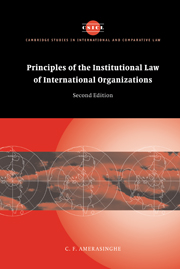Book contents
- Frontmatter
- Contents
- Preface
- List of abbreviations
- Table of cases
- 1 Introduction
- 2 Interpretation of texts
- 3 Legal personality
- 4 Membership and representation
- 5 Non-Judicial organs of organizations
- 6 Acts of non-judicial organs: their legal effect
- 7 Acts of non-judicial organs: the doctrine of ultra vires
- 8 Judicial organs
- 9 The internal law: employment relations
- 10 Privileges and immunities
- 11 Financing
- 12 Responsibility to and of international organizations
- 13 The liability of member states vis-à-vis third parties
- 14 Amendment of constitutions
- 15 Dissolution and succession
- 16 The settlement of disputes
- Index
- Cambridge Studies in International and Comparative Law
16 - The settlement of disputes
Published online by Cambridge University Press: 10 December 2009
- Frontmatter
- Contents
- Preface
- List of abbreviations
- Table of cases
- 1 Introduction
- 2 Interpretation of texts
- 3 Legal personality
- 4 Membership and representation
- 5 Non-Judicial organs of organizations
- 6 Acts of non-judicial organs: their legal effect
- 7 Acts of non-judicial organs: the doctrine of ultra vires
- 8 Judicial organs
- 9 The internal law: employment relations
- 10 Privileges and immunities
- 11 Financing
- 12 Responsibility to and of international organizations
- 13 The liability of member states vis-à-vis third parties
- 14 Amendment of constitutions
- 15 Dissolution and succession
- 16 The settlement of disputes
- Index
- Cambridge Studies in International and Comparative Law
Summary
Different kinds of disputes may arise which involve international organizations. First, there are those concerning the interpretation of the constitution of an organization. Disputes of this kind are generally between member states but may also be between the organization and member states or even between organs of an organization. The mechanisms for the settlement of such disputes have been discussed in Chapter 2.
Apart from this kind of dispute, there are other disputes in which organizations may be directly involved as parties, such as (i) those between them and states, their members or not, or other organizations, arising from conventional relationships or under general international law, (ii) those between them and their employees arising from the employment relationship and (iii) those between them and private parties or states or other organizations under relationships governed primarily by national law and within national or transnational systems of law. Such disputes are connected with the institutional sphere of an organization's life. Thus, the methods of settling such disputes will be examined in this Chapter.
There are also disputes between states in which the organization is interested for functional reasons, because those disputes arise from obligations within the functional framework of the organization as determined by its constituent instrument (e.g., disputes arising from the alleged violation of Article 2(4) of the UN Charter in the context of the functioning of the UN). These disputes are strictly not institutional.
- Type
- Chapter
- Information
- Publisher: Cambridge University PressPrint publication year: 2005



